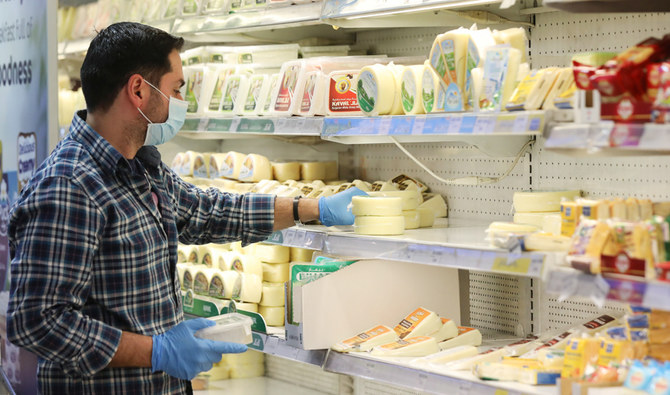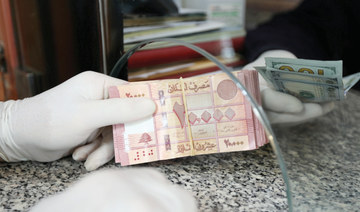BEIRUT: Lebanon on Saturday reported 10 new cases of the coronavirus disease (COVID-19), pushing the total number to 619.
The number of people in quarantine in hospitals is 1,282, 387, most of whom are from Mount Lebanon and 311 from the north.
During a tour to parts of Khroub district, where COVID-19 cases have been recorded, Health Minister Hamad Hassan described the results of the general mobilization as “good.” “We must continue to restrict movement and ban gatherings. We have been seeing stability in the cases’ figures,” he said.
The authorities have decided to impose a curfew on Sunday and during Easter to restrict people’s movement.
Bsharri district has entered a mass quarantine, starting on Saturday, in light of the growing number of cases. Eddie Lazem, the director of Bsharri’s government hospital, announced that the number of tests carried out in a few hours had reached 70.
The number of COVID-19 cases in northern Lebanon is 125, and there are 329 cases in Mount Lebanon. Matn district in Mount Lebanon continues to have the highest number of cases in Lebanon, with 124 infected people as of Saturday.
Dr. Abdul Rahman Al-Bizri, an infectious disease specialist and member of the emergency committee on coronavirus, told Arab News: “Tracking the sources of the novel coronavirus infection continues and might reduce the number of cases of unknown sources to three cases only.”
Meanwhile, video footage of a Lebanese doctor went viral on social media on Saturday. The date of the recording is unknown but it shows an exhausted doctor wearing a face mask in a room inside a medical center. An ambulance siren can be heard in the background. He speaks on the phone and says: “Can you recognize me? I cannot take my mask off. I’m very exhausted. I have been working for 30 hours, standing on my feet. Things are out of control here. One batch of patients after the other. We received yesterday a batch from Sayyida Zainab (in Damascus), all of whom are infected (with coronavirus). Everyone you ask would tell you they have been with an Iranian. Iranians have become producers of coronavirus. It is a catastrophe. I do not know why Sayyed Hassan Nasrallah is not interfering. It is a catastrophe. No one can carry on like this.”
Hashem Safieddine, head of Hezbollah’s executive council, spoke two weeks ago about Hezbollah’s plan to fight COVID-19. He talked about “the assigning of 24,500 doctors and paramedics to implement the plan, in addition to another team of 4,500 people from the party, municipalities (controlled by Hezbollah), and a medical team from Amal Movement.”
FASTFACTS
• The number of COVID-19 cases in northern Lebanon is 125, and there are 329 cases in Mount Lebanon.
• Four Middle East Airlines aircraft arrived in Beirut on Saturday, carrying Lebanese expatriates from Kuwait, Dubai, Rome and Lunda.
• A curfew will be imposed on Sunday and during Easter.
“This plan is in line with the government’s agencies and measures,” he said, highlighting that “it aims to stop the spread of coronavirus.”
Safieddine announced that St. George Hospital was prepared to receive coronavirus patients. He said: “We have rented and equipped private hospitals as a precautionary measure, and they will be used when needed. We have also established diagnostic centers to evaluate and examine the cases and determine the required procedures.”
“We have prepared 32 backup medical centers to fight coronavirus in all Lebanese regions, trained 15,000 people to fight coronavirus, conducted training workshops for some paramedics in the Palestinian camps, and equipped 25 ambulances with respirators and devices,” he said.
The administration of Al-Rassoul Al-Aazam Hospital, which is affiliated with Hezbollah, was quick to respond to the video footage. They said: “This (footage) was not recorded inside the hospital, and the doctor does not work here. The hospital does not receive any coronavirus patients because St. George Hospital has been prepared for this purpose.”
Meanwhile, four Middle East Airlines (MEA) aircraft arrived in Beirut on Saturday, carrying Lebanese expatriates from Kuwait, Dubai, Rome and Lunda.
The airplane returning from Kuwait carried 123 passengers, most of whom were families, some of whom had particular health conditions, in addition to Lebanese citizens whose residence permits in Kuwait had expired.
Lebanon’s Ambassador to the UK Rami Mortada announced that the embassy would implement measures to prevent anyone who did not have a negative PCR result from boarding the plane from London to Beirut, to ensure the safety of the journey and the Lebanese community.
MP Fadi Alame, a member of the Development and Liberation parliamentary bloc, headed by Nabih Berri, said that the measures taken were “on the right track.”
Alame, who is the owner of Sahel General Hospital in the southern suburb of Beirut, said: “The capacity of government hospitals is still within an acceptable range. There are quarantine centers in the districts that have contributed to relieving these hospitals. The challenge is to continue to secure the supplies for the medical and nursing staff, who are in direct contact with coronavirus (patients). These supplies are declining around the world. There are attempts to manufacture them locally, and we are seeking to do so.”
















